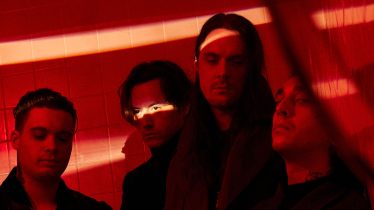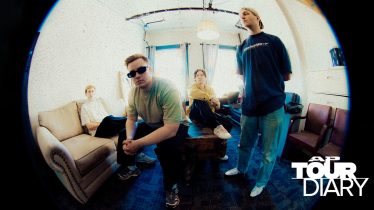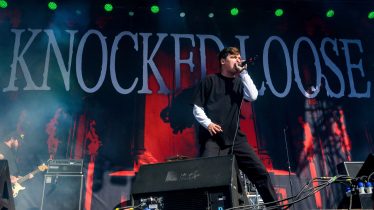Halo Boy knew quarantine was the right time to discover his music style
Despite growing up on radio-edited pop music before being introduced to grunge, electro-industrial and the iconic drumming of blink-182’s Travis Barker, Cameron Cade, aka Halo Boy, has managed to meld his greatest influences with ease for his unique creations. Drawing from key vocal elements of pop music before adding in his own scratch-vocal flair, Halo Boy is resurrecting a sound reminiscent of several fundamental ’90s genres that are still influencing modern music to this day.
In his own words, Halo Boy is an alien. But not in the same extraterrestrial sense that David Bowie declared in the ’70s. Instead, Cade embraced the project and persona of Halo Boy, and rather than finding comfort in social settings, he’s most comfortable when he’s creating.
Read more: Architects have a platform and they’re using it for issues that matter
“I feel like I’ve been in the character of Halo Boy for so long and felt that way for so long that if I’m onstage or if I’m on a music video set or in the recording booth, that’s the only time I do feel very comfortable in myself,” he says. “I can be honest and move and speak and sing in a way that’s me. Then obviously the other aspects of going to meet somebody or to a party or just out in public, that’s when I feel very out of my element.”
Creating a visual and sonic space erupting with his honest approach to fame (also the title of Halo Boy’s most recent single), societal pressures and the need to focus on his own endeavors, Halo Boy is stationed at the front lines and ready to fire.
You produce a lot, if not all, of your own music. Who’s the first person you play your music for?
The first person I play my music for is probably my girlfriend. Honestly, I don’t really play it for anybody for a while, and I just keep it to myself and live with it for a little bit. There’s a bunch of answers to this question because it changes. Lately, I’ve been sending it to Benji [Madden], Josh [Madden] and Jacob [Mann]. In the past, I’ve just kept it to myself, and people hear it when it’s released.
Because you self-produce everything that you create for your Halo Boy project, how do you determine when a song is complete?
Early on, I used to really overthink everything, and I would sing things over and over again. I’d rewrite lyrics over and over again, reproduce the songs over and over again. I just felt like the result sucked the life out of a song, and I know that process works for a lot of great artists. But for me, I just always felt like [I liked] the initial demo that I made with the scratch vocals better than this overproduced product that I have at the end.
For a while now, but definitely the last year, I don’t even write anything down anymore. I just go into the vocal booth, and I sing what is coming to mind, and as it’s being recorded, it’s being written, I get to a point where I’m happy with it as a listener, and then that’s it. I call it done at that point because I just feel like there’s this threshold that you can cross as a producer [where] you can just start making things too perfect.
Read more: Bad Suns’ Christo Bowman knows exactly who he’d bring on his dream tour
It just becomes lifeless then, and it could be a great song, but it just doesn’t have that human element to it anymore. I think that’s really important. We can listen to Beatles recordings now, which are sometimes out of time or the singing is a little out of tune or it’s a very live feeling, but that’s what makes it fun. Everything’s really loose and fun. That’s how “Fame” was, too. Nothing is quantized or edited to a grid or anything like that. It’s just got a very human feel throughout the whole thing.
You used to do some production for other artists before you really started focusing on your own music. How did you determine when it was time to focus on your art versus somebody else’s?
That was actually an interesting time I went through because initially when I was in high school, I started writing songs and singing when I was like 14. I got Pro Tools and started producing, but I was very determined because in my hometown, there weren’t any resources. You couldn’t just go to a recording studio or meet producers.
So I figured I should learn how to do everything myself. And the goal was just to be an artist initially, and then it evolved to where I started helping friends with their music, and it just so happened that I started to get a little bit more traction within the music industry through producing other people.
Read more: Samurai Shotgun feel like the lyrics to “Limbo” arrived out of nowhere
I don’t think people really liked my music at first, and they viewed me more as a producer, and I was pretty sad about that. But also I thought, “I’ll just keep developing my art and in the meantime keep making music.” It was a good way to make a living, and it was the path that life took me and that I didn’t plan on.
After a while, it was really bothering me that I wasn’t focusing on what I really wanted in the first place. I started Halo Boy a couple of years ago, but it was really the last year, during the quarantine, that I was like, “All right, I’m going to go back into my own world completely because that’s what everybody has to do now. I’m going to just focus every day on making great music that I love and focus on finding my personal style and what I really want to say.”
For “Fame,” do you remember when the idea came to you and how long it took for you to turn it into a fully realized song?
It happened pretty quickly actually. I had made the initial groove for it where I was just drumming on my desk with a pen and I was like, “Oh, that sounds cool.” A lot of my songs start with drums and get a rhythm going. I was like, “I like that tempo. That feels very loose and not completely straight but not completely shuffled.”
It had a good feel to it, so I started to record myself drumming with these pens on my desk. So I turned on the microphone, got that down and then I started putting some bass ideas down, and it ended up being a chopped-up bass thing that I made.
And then after that, I just went in and started singing over it and the verses where it came first. [Singing.] “She’s so bored with the pickup lines”—that was the first thing I sang. And then I was like, “Oh, this is about a lot of these girls that I’ve had experience with in this culture.” It just all came to me like, “Oh, this is going to be about fame.”
Read more: Deb Never announces upcoming EP with dreamy single “Disassociate”—listen
I ran back, put some more kicks and snares in there and a little bit more production, then went back in and did the chorus. It seemed really obvious to me to land on that really deep, affected voice at the end of the chorus saying “fame.” I don’t know where the inspiration even came from, and it’s almost like 2000s pop. I did that, and then I had some saxophone samples I was playing around with, and just as a joke, and I was like, “It would be funny to put saxophone in here like Dave Matthews or a Prince song or some weird thing like that.” [Laughs.]
It wasn’t the actual part that’s in there now because I chopped it up and retuned it and made it into what it is, but it was something reminiscent of it, and I just threw it in there, and I was like, “Oh wow, that’s really fun.” I can’t deny that it’s fun, and that’s what this is all about. To make something that hopefully other people want to listen to and it lifts them up in some way.
This interview appeared in Issue 394 featuring cover stars Waterparks, available here.







